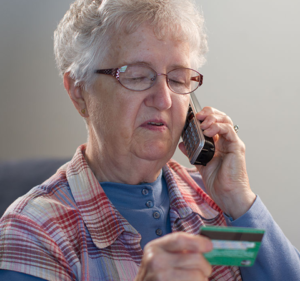
Use these tips from NCOA and the Women’s Institute for a Secure Retirement to protect yourself or an older adult you know.
Be aware that you are at risk from strangers—and from those closest to you.
Over 90% of all reported elder abuse is committed by the older person’s own family members, most often their adult children, followed by grandchildren, nieces and nephews, and others. Common tactics include depleting a joint checking account, promising but not delivering care in exchange for money or property, outright theft, and other forms of abuse, including physical abuse, threats, intimidation, and neglect of basic care needs.
Always tell solicitors: “I never buy from (or give to) anyone who calls or visits me unannounced. Send me something in writing.” Don’t buy from an unfamiliar company and always ask for and wait until you receive written material about any offer or charity.
It’s also good practice to obtain a salesperson’s name, business identity, telephone number, street address, mailing address, and business license number before you transact business. And always take your time in making a decision.
Identity theft is a huge business. To protect yourself, invest in—and use—a paper shredder. Monitor your bank and credit card statements and never give out personal information over the phone to someone who initiates the contact with you.
Visit Do Not Call to stop telemarketers from contacting you.
Be careful with your mail. Do not let incoming mail sit in your mailbox for a long time. When sending out sensitive mail, consider dropping it off at a secure collection box or directly at the post office.
To get more tips on protecting yourself from fraud, visit On Guard Online, which has interactive games to help you be a smarter consumer on issues related to spyware, lottery scams, and other swindles.
Use direct deposit for benefit checks to prevent checks from being stolen from the mailbox
Using direct deposit ensures that checks go right into your accounts and are protected. Clever scammers or even scrupulous loved ones have been known to steal benefits checks right out of mailboxes or from seniors’ homes if they are laying around.
Never give your credit card, banking, Social Security, Medicare, or other personal information over the phone unless you initiated the call
Misuse of Medicare dollars is one of the largest scams involving seniors. Common schemes include billing for services never delivered and selling unneeded devices or services to beneficiaries. Protect your Medicare number as you do your credit card, banking, and Social Security numbers and do not allow anyone else to use it. Be wary of salespeople trying to sell you something they claim will be paid for by Medicare.
Review your Medicare statements to be sure you have in fact received the services billed, and report suspicious activities to 1-800-MEDICARE.
Be skeptical of all unsolicited offers and thoroughly do your research
